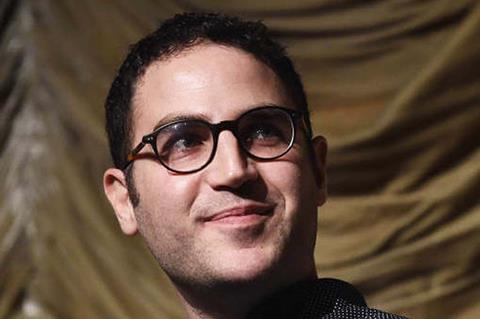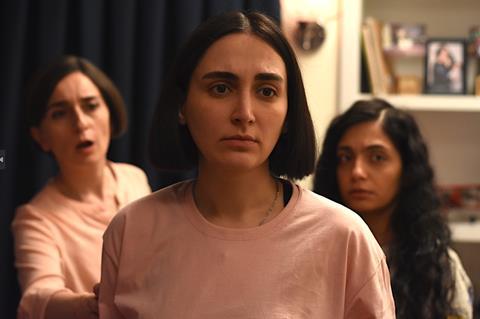
Jeff Deutchman scrambled into the first buyers screening of Anatomy Of A Fall in Cannes last year, and three days later Neon’s head buyer had acquired Justine Triet’s French courtroom drama. A week later the film won the Palme d’Or, and this March it claimed the best original screenplay Oscar.
To get from one end to the other of this wild ride took ironclad belief, instincts honed over years of acquiring the festival world’s finest arthouse gems and a unique understanding and desire shared among a small but very effective team.
One year on and Neon is back in Cannes with Sean Baker’s Competition selection Anora. The company pre-bought the comedy drama, about a sex worker, at script stage and it premieres on Tuesday (May 21). “We had tried to buy [Baker’s] The Florida Project back in the very early days of Neon and we lost out to A24,” says Deutchman, who joined Neon when Tom Quinn launched the company in 2017. “I’ve always loved his work. Anora is his best film yet.”
While Neon has had the last four Competition winners, an exceptional feat, the president of acquisitions and production would rather not speculate on whether Anora or perhaps an onsite acquisition can extend the company’s reputation as the Palme d’Or whisperer to five in a row, after Anatomy, Triangle Of Sadness, Titane and Parasite.

As it is Deutchman and his team — there are seven Neon-ites on the ground this year, meeting financiers, scouting talent, and looking for acquisitions — have been busy on the Croisette. There have been two market buys on upcoming French films, reuniting with Titane director Julia Ducournau on Alpha, and The Unknown from Triet’s Anatomy co-writer Arthur Harari, plus Stephen King horror The Monkey and Mohammad Rasoulof’s Palme d’Or contender The Seed Of The Sacred Fig.
The company’s strategy is to eschew “the lazy approach to Cannes”, says Deutchman. “The only real way to do Cannes is to go see as many movies as you can, because you never know where the next Dogtooth or Border or Hunger or Force Majeure is going to come from,” he says, citing several modern Cannes standouts championed by arthouse buyers.
In the works
Bolstering the pipeline is Neon’s burgeoning production business, now led by Allison Rose Carter and Jon Read, previously of Savage Rose Films and co-producers on Everything Everywhere All At Once. Early titles include Tilman Singer’s Berlinale entry Cuckoo and Brandon Cronenberg’s Infinity Pool.
Coming up are It Follows sequel They Follow, an untitled film from Boots Riley, and Joshua Oppenheimer’s Golden Age musical The End, a potential Venice selection.
Productions generally fall in the sub-$30m range although they could go higher, especially in light of a slate deal with Ken Kao’s Waypoint Entertainment, a producer on Cuckoo. Neon’s taste spans genre and language, just as with acquisition titles. “It’s the rare films that are unique enough to break through the noise and demand that people leave their home for the cinema — that’s the single rule we apply to everything we do,” he says.
Neon is renowned for its advocacy of theatregoing, led by Quinn. It is a refreshing outlook backed by action at a time when fewer and fewer distributors are willing to take big bets. “Theatrical [release]doesn’t work for all films,” says Deutchman, “but for the right films, there is no better way to maximise your audience to create cultural relevance and to score real financial upside.”

Anatomy Of A Fall earned $5m at the US box office, making it the fourth-highest foreign-language specialty release of the past decade. “It seems as though recent [Cannes Competition] juries have been choosing films that have that ability to connect with not just American audiences but with international cinephiles all over the world in a lovely coincidence,” he says.
Sydney Sweeney convent horror Immaculate passed $15m earlier this year. For Neon to achieve box-office success, it prefers to focus on each film and not burden itself with an unwieldy slate. That said, the company tends to target one film at any given market or festival. Except that it bought two last year when a colleague advocated passionately for Wim Wenders’ Perfect Days, which became Japan’s Oscar submission and earned an Academy Award nomination.
At time of writing Neon had picked up The Seed Of The Sacred Fig in Competition, plus the three aforementioned films at the market. There could be more. “Rules like that are meant to be broken,” laughs Deutchman, “based on the fact that we are humans who fall in love with movies.”






![The Brightest SunScreen[Courtesy HKIFF]](https://d1nslcd7m2225b.cloudfront.net/Pictures/274x183/3/5/0/1448350_thebrightestsunscreencourtesyhkiff_312678.jpg)


















No comments yet